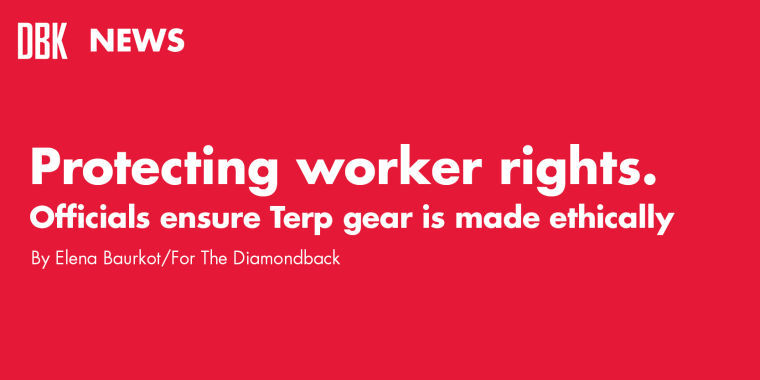
Protecting workers rights – Graphic
University officials are taking steps to ensure Terps gear is ethically and safely produced just more than a year after Bangladesh’s Rana Plaza garment factory collapsed and killed more than 1,100 workers.
The accident, which took place April 24, 2013, spurred international efforts to protect workers’ rights, including two agreements companies can sign to promise their clothing is ethically made, said Garrett Strain, a United Students Against Sweatshops national organizer. Officials at this university have already identified one apparel producer they will be dropping for failure to comply with ethics codes, officials said.
The university licenses its logos to clothing companies for use on apparel, said Joe Ebaugh, university trademark licensing director. The products are then sold at stores as officially licensed merchandise. While university officials can’t control how the clothing is made, they can control their brand image by contracting only apparel producers that have signed the Accord on Fire and Building Safety in Bangladesh, as 16 universities have already done, Strain said.
The accord is a legally binding agreement requiring regular safety inspections of Bangladeshi apparel factories. And while this university is not one of the 16 that have signed, Ebaugh said officials are taking steps to encourage their contracted companies to embrace worker safety.
Ebaugh sent letters last month to eight university–contracted companies that he could not confirm had signed the accord or a similar agreement called the Alliance for Bangladesh Worker Safety. The letters urged the companies to join one or the other, and Ebaugh said a company’s response affected their chances of extending their licensing contracts, which are up for renewal July 1.
The alliance is similar to the accord in that it is also a legally binding agreement that mandates factory safety inspections. But the main difference is that the alliance is an agreement between companies and retailers instead of companies and unions, as in the accord, Deborah Drew, the alliance’s operations manager, wrote in an email.
The companies had 30 days to respond with a plan of action, Ebaugh said, and all but two complied, either signing the accord, joining the alliance or proving their products were not made in Bangladesh. A seventh company replied that it did not produce clothing.
Ebaugh said the university will not renew the contract with one company, Isaac Morris Ltd., which did not respond to the initial letter. Officials sent the company a follow-up letter announcing the decision Wednesday.
The accord and the alliance have stirred controversy among experts, some of whom said the agreements are not specific or strong enough to address the problems they seek to solve.
An April report on the apparel industry’s business practices in Bangladesh conducted by New York University researchers Sarah Labowitz and Dorothée Baumann-Pauly concluded both the accord and the alliance are insufficient. They do not reach factories where workers are most at risk, clarify where the money for factory renovations will come from or address indirect sourcing, in which factories subcontract manufacturing to other factories to cut costs, the report found.
Indirect sourcing creates a web of contracts and production flow that is confusing even to regulators, according to the report, and the system plays a major role in Bangladesh’s garment industry.
Encouraging companies to join the accord or the alliance is a good thing, Labowitz said, but more needs to be done to effect real change.
“University license stores should be encouraging their licensees to look at their full supply chains and to understand the implications of indirect sourcing in the products that end up being sold in their bookstores,” Labowitz said.
Sophomore elementary education major Kim Turner agreed with the decision not to renew the Isaac Morris contract but said that the university should only contract companies that sign the accord or the alliance. A company saying they do not manufacture in Bangladesh is not enough, she said.
“There’s no harm in signing something that will give you more credibility and make them seem safer,” she said.



